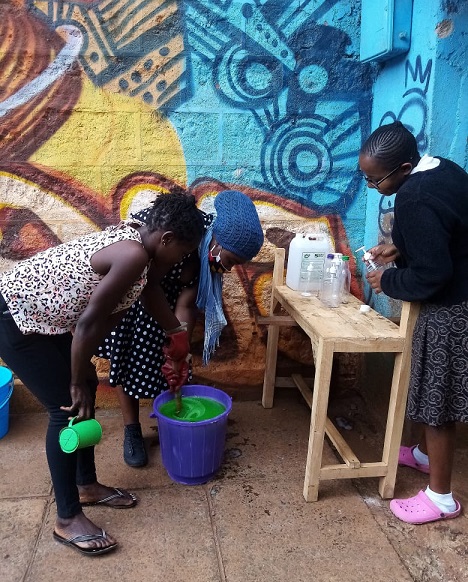
‘In order to survive we were forced to be creative’: Rhoda
Upcycling factory offcuts and old tyres to make handbags and sandals. That was the Uwezo Wema Self-Help Group’s business model, and for two years, it worked. Then came the coronavirus and, according to group chairperson Rhoda, “everything changed”.
“Business performance has gone down, and the usual products we used to sell during the pre-corona period are no longer in high demand due to change in people’s expenditure,” she explains. “In order to survive we were forced to be creative.”
If demand for sandals and bags had cratered, for two others items it had gone through the roof. So it was that Rhoda and her Uwezo Wema sisters started making and selling face masks and soap, finding themselves front and centre in their community’s response to Covid-19.
Babadogo, Nairobi
A world in turmoil. A country in lockdown
Taking rare a break from her sewing machine recently, Rhoda spoke to her Hand in Hand trainer over the phone. Visiting, she agrees, would be out of the question. Just days after its first confirmed case in early-March, the government of Kenya imposed a strict and wide-ranging lockdown on this country of 51 million, fearing its health system couldn’t cope. Inter-county travel was banned and a 7 pm to 5 am curfew was imposed, but millions of Kenyans who had to work to survive, did. The result, say officials, is a country where “the virus is firmly in our midst.”
To the extent that Kenya weathers the storm, it will because of people like Rhoda and the Uwezo Wema Self-Help Group leading the grassroots response. “The government is not able to fight this disease alone,” she says. “The largest responsibility lies with individual citizens to ensure they wash their hands, sanitise, wear masks and maintain social distance. My job as a businesswoman is to help them do that.”
With access to tens of thousands of members in dozens of counties countrywide, Hand in Hand’s job as an NGO is to help businesswomen like Rhoda lead the way. In only a month, our trainers have reached more than 11,000 members over the phone to provide advice on retooling their businesses to make face masks and soap. Aside from empowering tens of thousands of Kenyans to fight the spread of the virus, we’re keeping thousands of businesses from going under.
‘We are thankful’

Uwezo Wema group members make soap from alcohol, aloe vera and lemon.
Rhoda, it turned out, had beaten us to the punch. “After the government announced the precaution measures to be put in place like washing of hands with soap and disinfecting our hands and wearing masks, we decided to focus on the production of masks and sanitisers. This is because there was no big competition as in the liquid soap making,” she says.
The transition from bags to masks was straightforward enough, says Rhoda, who quickly developed a prototype after watching instructional videos online. For the most part, the group is still using upcycled cloth offcuts – keeping their business environmentally sustainable even as they contribute to the greatest public health push in Kenya’s history. Filters between the masks’ two layers and heavier cotton to keep them durable have marginally increased costs. As for making soap, Rhoda remembered a recipe from one of her Hand in Hand training modules using alcohol, aloe vera and lemon.
“We currently sell about 200 masks and anywhere from 15 to 50 litres of soap a day,” she says. It’s enough to bring in about 20,000 KES (US $200) a month – a far cry from the 100,000 KES (US $1,000) her group made each month before the virus, says Rhoda, but “we are thankful that at least we can make something during such a time.”
For those lacking the luck – and savvy – of the Uwezo Wema Self-Help Group, Rhoda keeps back a number of masks each day to give away. “But not to everyone,” she says. “We need to earn some profit for sustainability.”
By the numbers
200 masks and 32.5 litres of soap sold each day
20,000 KES (US $200) a month in income
11,000 members reached with advice on making face masks and soap
Next case study: Meet Gloria, the former refugee growing crops – and profits
